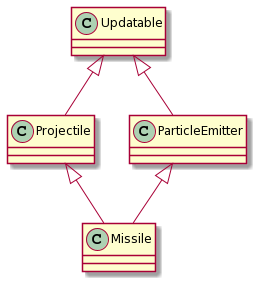We removed multiple dispatch recently to make the compiler simpler and the code generated faster https://github.com/nim-lang/RFCs/issues/65
Multiple inheritance seems to be introducing complexity and also make the generate code slower as well due to having to introduce branches in the dispatching code (single or multiple inheritance then checking the class methods).
Furthermore, just like multi-dispatch can be implemented in a library with a visitor pattern for a single-dispatch language (not that I like it) with decent performance (all C++ compilers including Clang uses this pattern), you can use macro today to implement multiple inheritance on top of object variants or concepts or methods.
For example here is how you can emulate classes with variant types: https://github.com/mratsim/trace-of-radiance/blob/99f7d85d/trace_of_radiance/support/emulate_classes_with_ADTs.nim#L246-L268
type
Color = object
Ray = object
HitRecord = object
Metal = object
Lambertian = object
Dielectric = object
func scatter(self: Metal, r_in: Ray, rec: HitRecord): Option[tuple[attenuation: Color, scattered: Ray]] =
debugEcho "Scatter on Metal"
func scatter(self: Lambertian, r_in: Ray, rec: HitRecord): Option[tuple[attenuation: Color, scattered: Ray]] =
debugEcho "Scatter on Lambertian"
func scatter(self: Dielectric, r_in: Ray, rec: HitRecord): Option[tuple[attenuation: Color, scattered: Ray]] =
debugEcho "Scatter on Dielectric"
declareClass(Material)
registerSubType(Material, Metal)
registerSubType(Material, Lambertian)
registerSubType(Material, Dielectric)
registerRoutine(Material):
func scatter(self: Material, r_in: Ray, rec: HitRecord): Option[tuple[attenuation: Color, scattered: Ray]]You can easily go the over way around, create an abstract scatter type (or generic, or variant or inheritable) and then define your proc on top and via macro "register"/inherit them to other types. This would be significantly faster, especially for gamedev, because it completely avoids GC, uses static dispatch and preserve memory locality instead of dereferencing random heap location and incurring cache misses.
Now beyond what is possible today, instead of inheritance I'd rather have concepts be expanded to work on runtime types https://github.com/nim-lang/RFCs/issues/168 and encompass Rust traits and Go interfaces in terms of capability.
What is Multiple Inheritance (MI)
MI allows an object/class to inherit the characteristics and features of more than one parent object or class.
From this point forward I am going to refer to object types as
classesfor simplicity.Why would we want it?
I will start by saying, MI is not always the right tool for the job - but sometimes, it is (or at least is a decent option).
Multiple inheritance allows for easy composition of small classes that implement independent functionality and can manage their own state. When used correctly, we end up with a lot of small and reusable code without having to duplicate functionality or data structures.
Why don't you just use ECS?
I've yet to see an ECS implementation that wasn't tedious and difficult to deal with.
MI reads and writes cleanly.
Example of MI in Nim
This is how I envision multiple inheritance in Nim:
In this example, Player inherits the
xandyproperties ofLocatable, and we could now invoke the methodupdatewith aPlayeras a parameter.Locatable and Updatable are free to be reused by any new objects, without having to affect the structure of
Player.Deadly Diamond of Death!
Most complaints regarding the implementation of MI, is The Diamond Problem.
Here is an example:
Let's create the problem with some Nim pseudo code to illustrate:
The Diamond:
If we invoke
missile.update(0.15)as shown above, we don't know which update should be invoked. Should it callProjectile's update, orMissile's update? In this case, a complier error should be thrown due to ambiguity.Solutions
There are many ways other languages have solved the diamond problem (see this wiki article about mitigation)
My proposed solution is to force the user to implement the method, and use procCall to invoke any parent implementations they want.
From the above example, the user could write this for the
Missile:In this case, we could detect calls to the base class (Updatable) and structure our code to prevent multiple invocations. The code would be translated as:
Closing Thoughts
I've seen multiple people wanting some sort of multiple inheritance in Nim (see this post as a recent example) - I think it would be a good change that would not negatively affect those who don't care for the object oriented paradigm.
@Clyybber